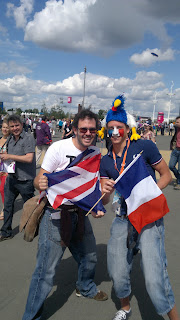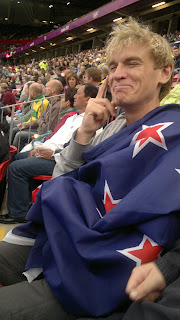Found a great piece by Bill Simmons on the experience of watching a top level sporting event with little to no clue what's going on (he's another handball convert too, by the way... the gospel is spreading!), and I'm getting the same experience at the Excel centre. Fencing is lightening-fast, decided by inches, and, in this instance, a very long way away to our right. Supposed category B seats are dire - only seven rows back, but with all the action miles away to the side.
As the rounds progress the action becomes clearer, like eyes adjusting to darkness or finally working out what anyone's saying in the third act of a Shakespeare play. There's a dramatic spirit at work, as our perception of fully masked competitors is shaped by their body language alone. Brilliantly, there is every bit as much Puss In Boots posturing in this sport as you would hope. Competitors scream primally at their opponents in victory and at their coaches in defeat. Technical judgements can be celebrated like Stuart Pearce at Euro 96. It's hard to think of this as a combat sport before seeing it live, but the pugilistic intensity of the combatants harks back to the sport's deadly origins.
Competitors fight in three rounds of three minutes each, with the winner the first to score 15 hits or the leader after the nine minutes have elapsed. In this preliminary session there are four pistes, while at night the venue becomes even more theatrical, with all the arena in darkness save the central competitive strip.
After a few moments offootwork and defence, someone makes a thrust, more dramatically a lunge, or most enthusiastically of all a flying lunge, which, in one of the best piece of faux smut in this (the XXX) Games, is known as a flunge. At this point there's a flurry of swords, two lights flash almost simultaneously and men spin away with arms in the air claiming victory like two premiership footballers fighting over a throw-in. Once the judge makes a decision, they can re-set and begin again.
As the rounds progress the action becomes clearer, like eyes adjusting to darkness or finally working out what anyone's saying in the third act of a Shakespeare play. There's a dramatic spirit at work, as our perception of fully masked competitors is shaped by their body language alone. Brilliantly, there is every bit as much Puss In Boots posturing in this sport as you would hope. Competitors scream primally at their opponents in victory and at their coaches in defeat. Technical judgements can be celebrated like Stuart Pearce at Euro 96. It's hard to think of this as a combat sport before seeing it live, but the pugilistic intensity of the combatants harks back to the sport's deadly origins.
We decide to compensate for the relative anonymity with the use of nicknames. Instantly, the event takes on new meanings. Mr Cholmley Warner in his yellow stockings is beaten by the Egyptian Ramases. The Count (from Romania, obviously) threatens bto upset the Prince (the aristocratic Italian favourite Aspromonti) by taking a 5-0 lead, but the wounded Italian snarls his way to a comeback victory. There's a battle between two Frenchmen who've done the nicknaming for us – Mr Strong (Le Fort) loses out to M. Le Pechoux (Mr Fishy?). Never give yourself a champion's name unless you can live up to it.
The match of the day comes in the last 16 round, where Japanese world number 16 Yuki Ota gives Italian World Champion and number 1 Cassara a terrific battle, taking him to sudden death at 14-14 before giving best. Returning to action almost without rest the Italian is then outed in his quarter final by the Egyptian Abouelkassem (ne Ramases), who jumps around the arena in triumph. Cassara's team mate Aspromonti leads his Chinese opponent 8-5, then loses his head in spectacular latin style, and crashes out 8-15.
With the finals to be held in this evening's session, I suddenly find myself with another event to watch. Can the Egyptian team have more reason to jump around?
























